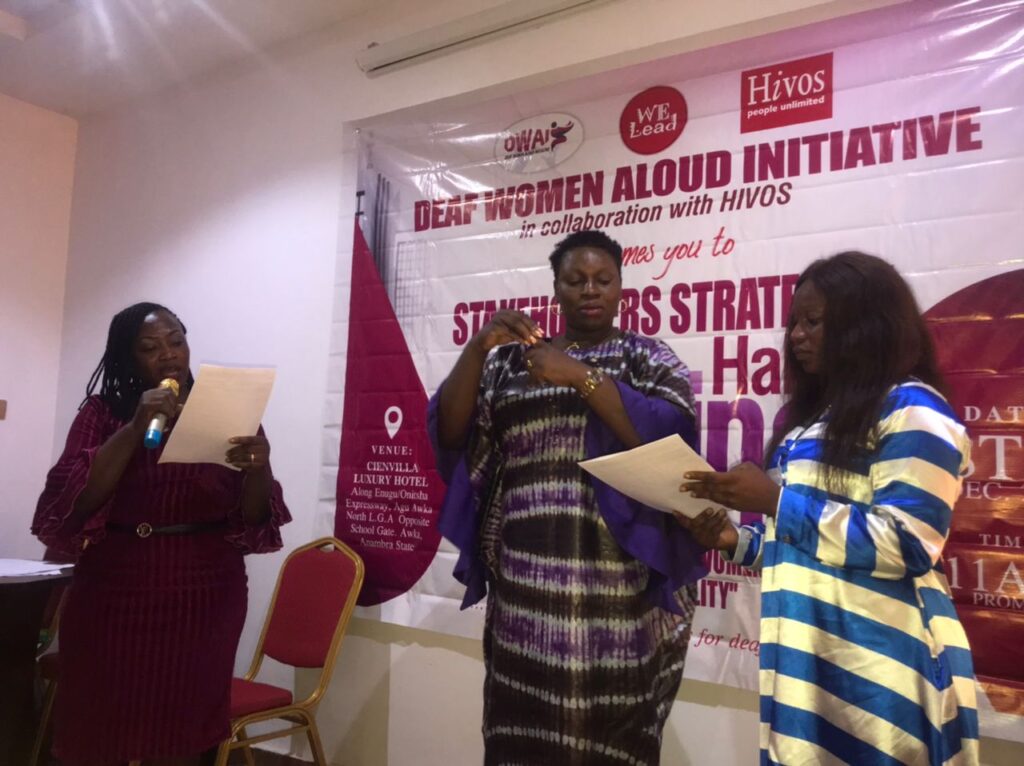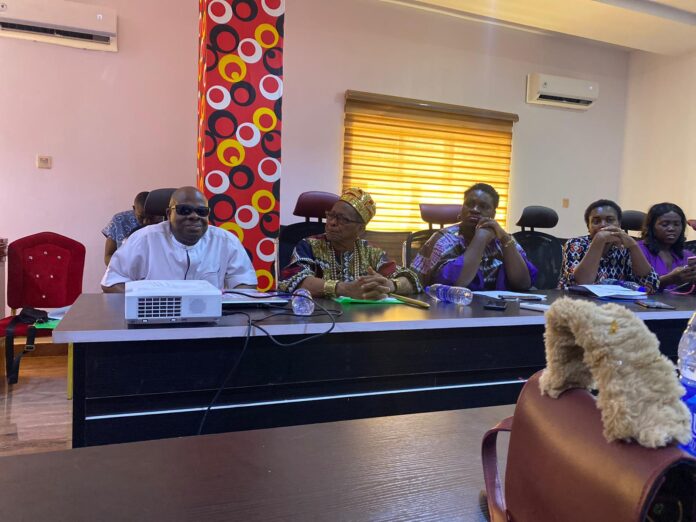By Chidimma Ajemba
In continuation of the Deaf Inclusive Sexual Health(DISH) project sponsored by HIVOS and We Lead, the Deaf Women Aloud Initiative(DWAI) has held a stakeholders strategic/town hall meeting on Thursday 8 December at Cienvilla Luxury Hotel Awka to address the barriers Deaf women and young girls face when trying to access healthcare services.
Addressing the participants, the executive director of DWAI, Mrs Helen Anurika Beyioku- Alase said that Sexual and Reproductive Health and Rights (SRH) is a key component to achieving universal health coverage.
“WHO believes that SRH is a game changer in countries developing policies to ensure equitable access to healthcare services.
She further revealed that universal health coverage clearly stated that everyone irrespective of who they are, must have a right to access healthcare services, especially women without encountering any form of barrier.
” It’s quite unfortunate that deaf women do not have access to healthcare due to communication barriers, stigmatization and discrimination.

” In some hospital doctors, nurses can not understand sign language and it becomes a barrier while communicating with pregnant Deaf women”.
Mrs Beyioku sadly noted the issue of communication barriers between healthcare practitioners and Deaf women often results in mistreatment, misdiagnosis, poor healthcare and complications.
She equally called on stakeholders, government and private institutions across the country to recognise the rights of persons with disabilities including Deaf women and girls to access health information by providing the services of professional Sign Language interpreters and also facilitating their access to healthcare and SRH information and services.
In his remark, the chairman of Anambra State Disability Rights Commission Barrister Chuks Ezewuzie appreciated the executive director of DWAI for always bringing in projects that will benefit the Deaf community immensely, describing her as a great disability patron of Anambra state.
Outlining what the ANDRC can do to ensure total access to Sexual Reproductive Health for the Deaf Community in the state especially women and young girls, Barr Ezewuzie noted that SRH must include protection against sexual violence.
“If there is any group that will subsensible to violence, it will be the Deaf women and young girls because people always try to take advantage of them not understanding their communication system.
The ANDRC boss committed that the commission will include in their sensitization program the awareness of the SRH needs of the Deaf community.
” The Anambra State Disability Rights Commission shall support any sexual abuse Deaf victim to get justice through our volunteer pro bono lawyers.
Moving forward, one of the resource persons Miss Ncheta Nwanokwara, woman leader Joint Nationals Association of Persons with Disabilities Anambra State Chapter while delivering on “Health Access for Women with Disabilities the journey so far” noted that over the years that women with disabilities have had to battle with divergent challenges in accessing quality healthcare services.
“Every woman with a disability has the right to SRH as embedded in Anambra State Disability Rights Law (ANSDRL 2018) and Disability Rights Act 2019 respectively.
She outlined some of the barriers women with disabilities often face when accessing healthcare services as lack of sign language interpreters, Health provider’s unruly attitudes towards women with disabilities, health providers’ ignorance of disability etiquette, health information not available in an accessible format, low-income and poverty, lack of health insurance, lack of accessible transportation scheme etc.
“Some of the rules and measures put in place by different service providers, especially the health sector do not favour persons with disabilities, especially women.
She said that most medical facilities do not take into consideration the needs of persons with disabilities
However, Miss Nwanokwara on a good note stated that Jonapwd Anambra and other CSOs have started using the health provision cited in the ANSDRL 2018 to engage relevant stakeholders on the content of the law and how it can be implemented.
In their separate goodwill messages the representative of Anambra State Town Union and Traditional Ruler Council Hon Ikechukwu Oforkansi and Igwe Ezenwata, pledge to extend the SRH needs for Deaf women in their various communities.
The meeting had in attendance representatives from the Nigeria Union of Journalists, Anambra Health Insurance Agency, Anambra Primary Healthcare Services, the Chairman of Anambra State Association of Deaf, Comrade Amobi Nwagwu, women with disabilities and gentlemen of the press.


